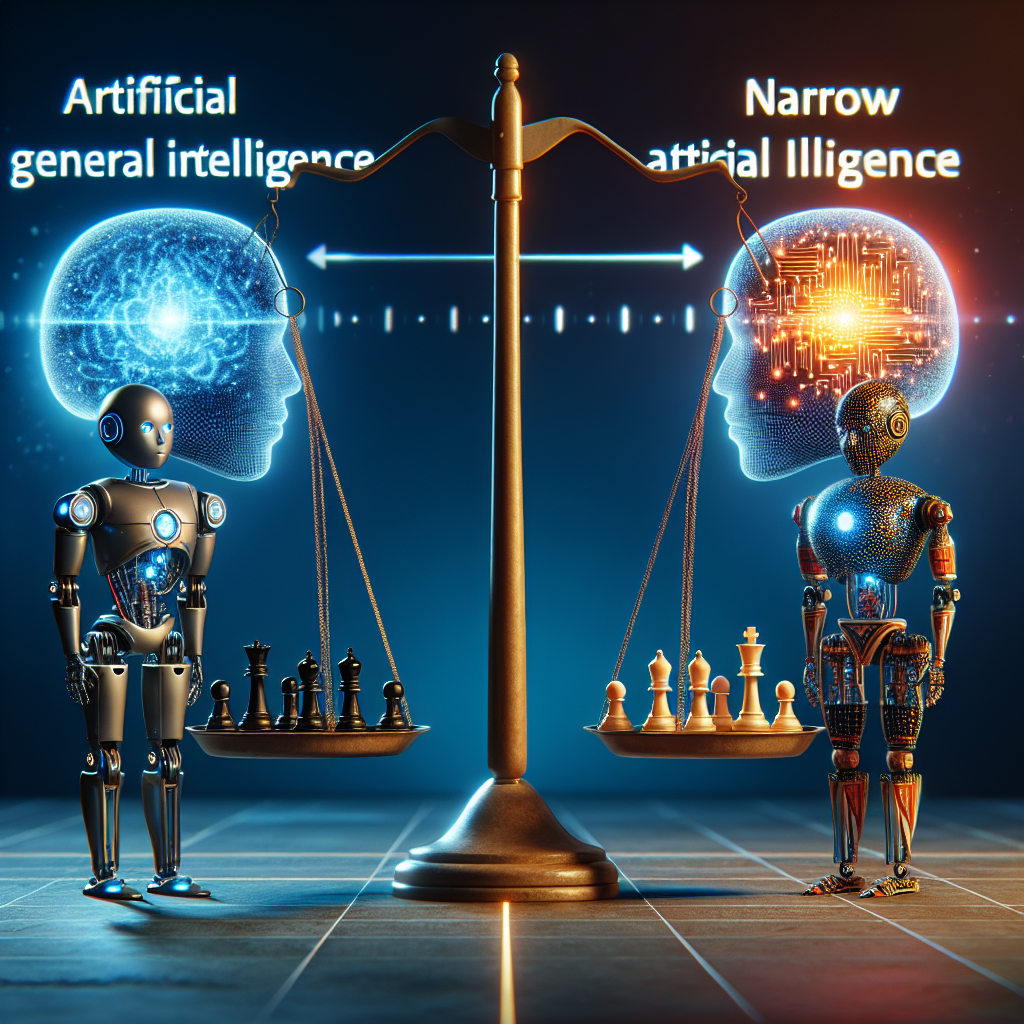Artificial Intelligence (AI) has become a hot topic in recent years, with its applications spanning across various industries and sectors. However, not all AI systems are created equal. There are two main categories of AI: Narrow AI and Artificial General Intelligence (AGI). Understanding the differences between these two types of AI is crucial for grasping their impact on society and the future of technology.
Narrow AI, also known as Weak AI, refers to AI systems that are designed for a specific task or a narrow range of tasks. These systems are highly specialized and excel in performing a particular function, such as image recognition, language translation, or playing games like chess or Go. Narrow AI is built to solve particular problems efficiently and accurately, but it lacks the ability to generalize its knowledge or adapt to new tasks outside its designated domain.
On the other hand, Artificial General Intelligence (AGI), also known as Strong AI or Human-Level AI, refers to AI systems that possess the ability to understand, learn, and apply knowledge across a wide range of tasks and domains. AGI aims to replicate human cognitive abilities, such as reasoning, problem-solving, creativity, and emotional intelligence. AGI systems are capable of learning from experience, adapting to new situations, and performing tasks that require human-level intelligence.
The key difference between Narrow AI and AGI lies in their scope and flexibility. While Narrow AI excels at specific tasks within a limited domain, AGI aims to replicate the breadth and depth of human intelligence across various domains. AGI systems have the potential to outperform humans in many cognitive tasks, leading to significant advancements in fields such as healthcare, education, finance, and transportation.
Impact of Narrow AI and AGI
Narrow AI has already made a significant impact on society, revolutionizing industries such as healthcare, finance, transportation, and entertainment. Narrow AI systems are used in medical imaging to detect diseases, in financial services to optimize trading strategies, in autonomous vehicles to navigate roads safely, and in recommendation systems to personalize content for users. The narrow application of AI has improved efficiency, accuracy, and productivity in various sectors, leading to cost savings, better decision-making, and enhanced user experiences.
However, the limitations of Narrow AI become apparent when faced with tasks that require contextual understanding, common sense reasoning, or creative problem-solving. Narrow AI systems are designed to follow predefined rules and patterns, making them less adaptable to new situations or unforeseen challenges. As a result, Narrow AI may struggle to generalize its knowledge, make inferences, or understand complex concepts beyond its training data.
In contrast, AGI has the potential to address these limitations by providing a more comprehensive and versatile solution to a wide range of problems. AGI systems can learn from diverse sources of data, reason through complex scenarios, and generate novel solutions to novel problems. AGI has the capability to understand natural language, interpret visual information, and interact with humans in a meaningful way. AGI systems could revolutionize industries by automating tasks that currently require human intervention, enabling new forms of creativity and innovation, and enhancing human-machine collaboration.
The impact of AGI on society and the economy could be transformative, leading to increased productivity, improved quality of life, and new opportunities for growth and development. AGI systems could revolutionize healthcare by diagnosing diseases more accurately, designing personalized treatment plans, and discovering new drugs. AGI could revolutionize education by personalizing learning experiences, adapting to students’ individual needs, and fostering lifelong learning. AGI could revolutionize finance by predicting market trends, optimizing investment strategies, and minimizing risks. AGI could revolutionize transportation by enabling autonomous vehicles, optimizing traffic flow, and reducing accidents. AGI could revolutionize entertainment by creating personalized content, immersive experiences, and interactive storytelling.
FAQs
Q: Will AGI replace humans in the workforce?
A: AGI has the potential to automate many tasks currently performed by humans, leading to concerns about job displacement and unemployment. However, AGI could also create new job opportunities in emerging industries and sectors, requiring human skills such as creativity, critical thinking, and emotional intelligence.
Q: What are the ethical implications of AGI?
A: AGI raises ethical concerns related to privacy, security, bias, accountability, and transparency. AGI systems must be designed and deployed responsibly to ensure they respect human rights, adhere to ethical standards, and mitigate potential risks.
Q: Will AGI pose a threat to humanity?
A: AGI has the potential to bring significant benefits to society, but it also raises concerns about the misuse of AI, the concentration of power, and the unintended consequences of AI systems. AGI must be developed and controlled in a way that safeguards human values, promotes social good, and ensures the well-being of all individuals.
In conclusion, understanding the differences between Narrow AI and AGI is crucial for grasping their impact on society and the future of technology. While Narrow AI excels at specific tasks within a limited domain, AGI aims to replicate human cognitive abilities across various domains. The impact of AGI on society and the economy could be transformative, leading to increased productivity, improved quality of life, and new opportunities for growth and development. AGI raises ethical concerns related to privacy, security, bias, accountability, and transparency, which must be addressed responsibly. AGI has the potential to bring significant benefits to society, but it also raises concerns about the misuse of AI and the unintended consequences of AI systems. AGI must be developed and controlled in a way that safeguards human values, promotes social good, and ensures the well-being of all individuals.

